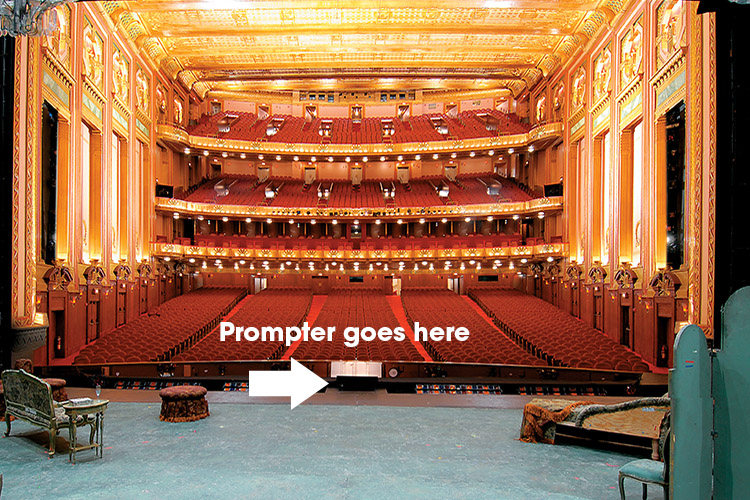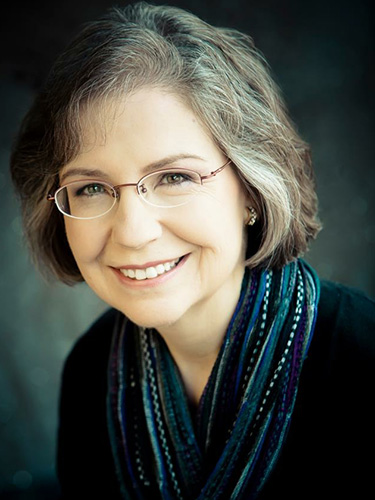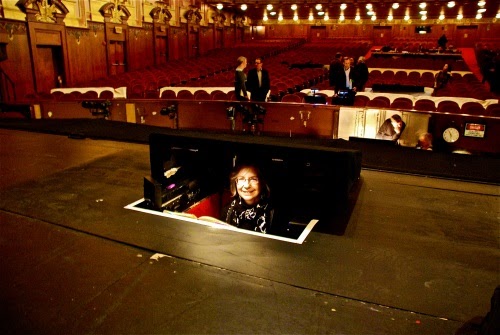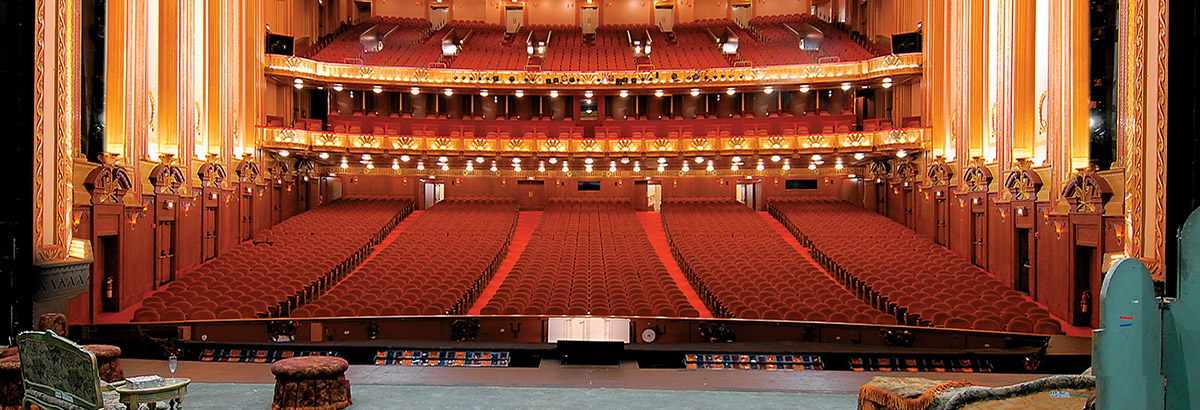May 04, 2020
Opera 101: Who’s in that box? The life of an opera prompter

If you come to see an opera performance at Lyric, you might notice a small, unobtrusive black box that sticks up slightly from the edge of the stage, positioned just above the orchestra pit.
Would you believe that a person actually spends an entire opera in that small space? It's the prompter's box! While the prompter might be hidden from view, it is an incredibly important job. A prompter is the liaison between the conductor in the pit and the singers on stage. Having a prompter is a safety net for singers who have to remember several hours of material, usually in foreign languages.
The prompter shows up on the first day of rehearsals knowing every note of the score—including every singer's lines. The prompter works closely with the conductor and cast throughout the rehearsal process, and often, in all of the performances. (Operas that cast members know well won't use a prompter in performance.) A prompter must practice constant vigilance—never diverting their attention from what's on stage just in case a singer needs extra help or attention. And they must know the entire score better than almost anyone else performing, able to provide a few lines, a pitch, or help singers stay in tempo. And they do it all while dodging costumes and errant props like fake blood!

Susan Miller Hult, an assistant conductor and prompter here at Lyric since 1993, takes us inside the box!
What is the rehearsal process like? How do you collaborate with the singers and conductor?
Even though they arrive with their roles fully memorized, at the beginning of the staging process the singers (with possible jet lag) are receiving a lot of new information and input and I often am asked for some help with words, especially if a role is being performed for the first time, or with a lot of different repertoire in between operas. It's an opportunity for me to find out how I can be of assistance. I often hear "watch me in this section, I tend to forget here" and "please let me know if you notice anything that I can improve," or "you're my best friend, I'm going to need a lot of help in the first few days." I also take notes of musical requests from the conductor to pass along to the singers.
Can you take us through a typical performance?
I arrive a half hour before the performance starts to double check my video and sound monitors, lights, and place my music. Then I greet the singers with "in bocca al lupo" ("into the wolf's mouth," the equivalent of "good luck" in Italian) and see if there are any concerns. I spend some time doing my own vocal warm ups, then a few minutes of quiet to center myself, breathe, and calm my nerves. I, thankfully, have a chair for most performances, occasionally a less-comfortable higher stool. I see the conductor via two video monitors, one on each side, and have a sound monitor with which I can hear the orchestra. I know if I have to turn up the volume (usually in sections where the strings are playing very quietly) the singers will have trouble hearing them onstage as well and may need extra assistance.
During the performances, I help the singers stay in sync with the conductor. I'm constantly watching their eyes for a signal that they might have a memory lapse, always ready to help in any way necessary to achieve best possible performance. If requested, I speak the first few words of each phrase in the traditional Italian style of prompting, or I am ready to give a word at the first moment of forgetting so the flow is not interrupted. I try to provide a constant sense of safety and encouragement to the artists onstage.
Exactly how big is the space you're in? Is claustrophobia an issue?
It is about the size of a phone booth, with a ceiling level that can change according to the production. Ergonomics are a constant challenge, as it can be difficult to maintain the healthy posture, movement, and breath support required to project my voice and keep alert and pain free. It's a very tight squeeze to climb into the prompt box from the orchestra pit—that part can feel quite a bit claustrophobic! Lyric's setup is very luxurious, however, compared to the terrifyingly narrow three-story ladder I climbed to the prompt box from the Bayreuth Festival's orchestra pit!

Susan Miller Hult peeks out from the prompter's box
From a prompting perspective, what is your favorite opera? And the most dreaded or difficult to prompt?
Whatever opera I'm currently prompting for is my favorite! The three that terrify me the most are Wagner's Die Meistersinger and Siegfried, and Janáček's Makropulos Case.
What is your most memorable moment during a performance?
The day of a performance of Die Walküre I was called to extensive rehearsals for the understudy of Sieglinde who had taken ill, and her understudy from the Chorus who would go on as one of the Valkyries. Then when I came back that night for the performance I found out that Wotan was also ill. It was very exciting and highly nerve-wracking at the same time—a very long 5 hours—prompting is not for the faint of heart!
Have any props ever come close to invading your prompter's space?
Actually, I leave the box when they throw knives or fire. I've almost been hit by knives, sword blades, a falling chair, broken glass, fake blood (which left a distressingly permanent red streak in my The Barber of Seville score), a stray foot when someone "died" too close to the box and couldn't remove it until the curtain fell, diaphanous costume trains, shards and dust from 200 plates smashed at the Götterdämmerung wedding celebration in a Bayreuth production, and I even ejected my glasses from the box once onto the stage in a frenetic moment, which were thankfully perfectly punted back to me by former soccer star, Sir Thomas Allen.
What is your musical background? Did you have a circuitous route to your role here at Lyric?
I have a bachelor's degree from Southern Methodist University in piano performance with minors in organ and French and a master's degree from the Eastman School of Music in piano performance. I furthered in Manhattan my studies of languages, diction, and other operatic necessities while coaching, accompanying, and working for regional opera houses. Then followed more study at the San Francisco Opera's Merola Program and a fellowship to learn prompting, which is highly specialized, passed from prompter to prompter. I had the great good fortune to study with the highly esteemed Susan Webb, formerly of Lyric Opera and the Metropolitan Opera, who had learned from the great Vasco Naldini of La Scala (of whom Renata Scotto has the highest praise and many great stories). After working at San Francisco Opera for five years I was invited to Lyric in 1993 to prompt Wagner's Ring with Zubin Mehta conducting. I loved working here so much that I was delighted to accept a full-time position and have been here ever since.
What is the most unexpected or surprising thing about your job?
The extreme amount of study and preparation it takes. I have to know the operas well enough to sing everyone's part with perfect pronunciation, understand every word, whether it be in English, Italian, French, German or Czech, and conduct an occasional rehearsal if needed. Of course, the rewards of total immersion in the most beautiful music, working with superb artists at this level, are greater than I could have possibly imagined.
Photos: Dan Rest, Susan Miller Hult in prompter's box courtesy of Chicagomusic.org
